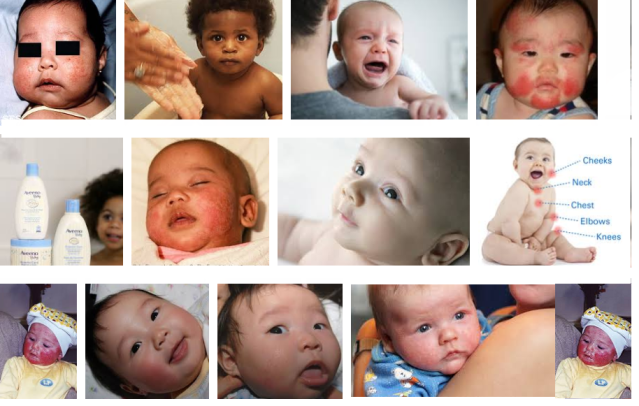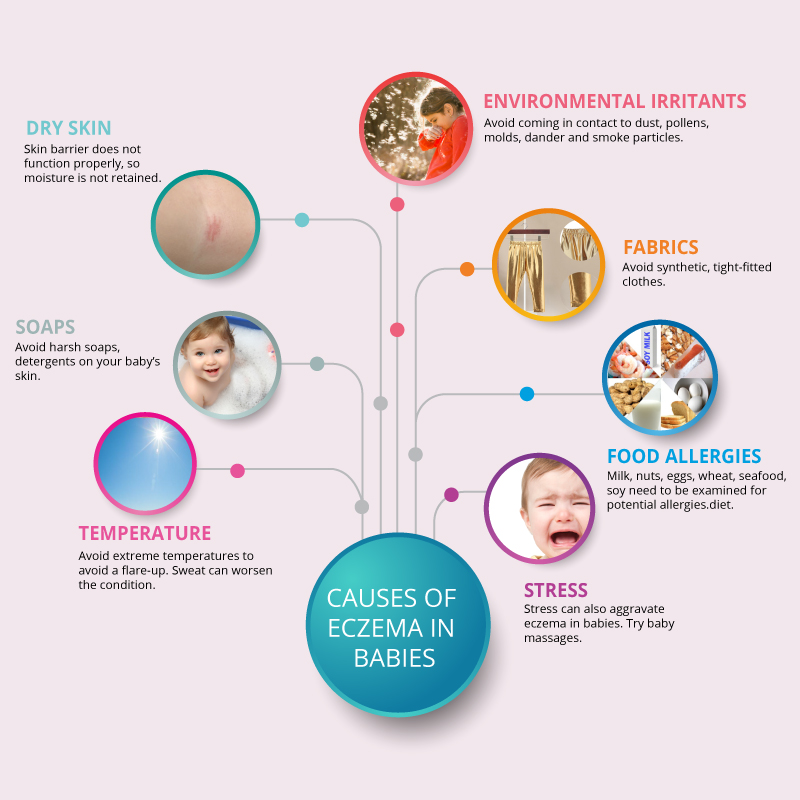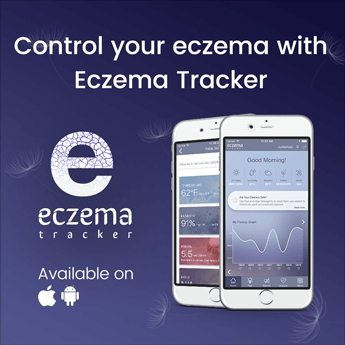Eczema is a disease affecting approx. 31.6 million and at least 17.8 million people in U.S, ranging from mild to severe eczema. The condition of eczema is more prominent in case of babies and children than in adults. On an average, 15% to 20% of babies are affected with the skin condition.
Most of the adults are found to have developed the eczema symptoms during their childhood. However, in many cases the condition becomes better as a child grows to enter their teens. The symptoms will either reduce or be treated completely.
However, What causes eczema in babies has been an issue of much debate. Since, the cause is not known, there are many theories and parents are left speculating whether it’s food, or the pet, or medication, or something they did that is causing their child to flare-up. What triggers one baby’s eczema won’t trigger another’s.
What are The Factors That Causes Eczema in Babies?

The actual cause for the development of eczema in babies is unknown, however, it is most commonly linked to genetics and environmental factors. The outside elements might trigger the immune system to generate a response that results in red and itchy skin.
Family history of Atopic Dermatitis, hay fever or asthma is another factor linked to the occurrence of Atopic Dermatitis in babies. As these babies grow, they may develop symptoms of hay fever or asthma.
However, the skin condition is not a communicable disease, so the baby can’t get infected by another person. Same way the baby can’t transmit the infection to someone else.
Most children get itchy rashes at some time during their childhood. Eczema generally is a nuisance that will make you scratch until bleeding and cracking of skin. The word “atopic” describes conditions that occur when immune system is overly sensitive to environmental allergens or irritants. These include pollens, molds, dust, animal dander, and targeted foods. “Dermatitis” signifies that the epidermis is infected, or red and sore.
Kids who get eczema normally have household members with hay fever, bronchial asthma, or other allergies. Some professionals suppose that these children may be genetically inclined to get eczema, which means that characteristics were handed on from mothers and fathers by way of genes that make a child more likely to get it.
About half of the children who get eczema can even someday strengthen hay fever or asthma themselves. Eczema will not be an allergy itself, however, allergy symptoms can set it off. Some environmental motives (reminiscent of excessive warmth or emotional stress) may trigger the situation. About 1 out of every 10 youngsters will experience eczema.
By and large, signs show up inside the primary few months of life, and almost always earlier than a little one turns 5. Good news is that greater than half of the youngsters who have eczema today will be over it by the point they are young adults.
What are the symptoms of baby eczema?
The symptoms of eczema baby vary for infants, toddlers and elder children. As the babies grow, the appearance and position of the skin condition starts to differ. According to each stage of the baby’s life, consider the following eczema symptoms in babies:
Eczema Symptoms in Babies during the initial 6 months
The following are the most commonly affected areas as a result of Atopic Dermatitis in babies:
- Face
- Cheeks
- Chin
- Forehead
- Scalp
However, the condition may not be limited only to these areas and can spread to other parts of the body. Most likely, the diaper area is the least possible to be affected by the skin disease due to moisture. During this period of time, the skin tends to appear red.
Eczema Symptoms in Babies during the 6 t0 12 months
During this phase, eczema usually affects the elbows and knees area. The locations are easily scratchable, hence, prevent the baby to itch-scratch the area. Scratching results in infection which ultimately leads to the formation of pus bumps on the affected dermis.
Eczema Symptoms in Toddlers during 2 to 5 years
At this stage, eczema has more commonly spread to the creases of elbows and knees, affected their hands, wrists and ankles. It may be even seen in the areas near the toddler’s mouth and the eyelids. The eczema may cause the skin to become dry and scaly with deep thick lines.
Eczema Symptoms in children – 5 years and above
Around this age, your child’s eczema is expected to appear in the folds of elbows and knees or may just affect the hands. Your child may complain of red and itchy patches behind the ears, on their feet or scalp. It is preferable to consult the dermatologist in order to make sure which types of eczema has affected the child during this stage. As most of the eczema types have some symptoms in common, hence, a specialist can differentiate and provide a thorough analysis.
What precautions do I undertake to avoid my baby’s eczema from worsening?
The foremost and key element towards managing eczema in babies or even adults is to control the itch. Each baby is different, hence, it is necessary as a parent to acknowledge the components in the surroundings that might aggravate the eczema symptoms.
Baby Eczema Pictures

 Also See – Eczema Pictures
Also See – Eczema Pictures
Baby Eczema Triggers
The most common baby eczema triggers include:
- Allergens
- High Temperatures
- Irritants
- Dry Skin
- Fabrics
- Stress
Also Read: Cotton Clothing For Babies With Eczema & Tips to Prevent Skin Flare ups
Allergens:
A debate still continues as to whether food allergies in babies trigger eczema or not. As per experts, eliminating peanuts, cow’s milk, dairy products, eggs or some fruits from the diet may effectively cure eczema symptoms. In addition to this, mothers that breastfeed their babies should avoid the consumption of such foods, as the baby may get exposed.
High Temperatures:
Sweat and hot climate can easily flare up the eczema symptoms. An alteration in the temperature or humidity can make the conditions worse. It is hard to manage the climatic conditions outside homes, but inside environment can be managed. For instance, if it’s hot and humid, make sure to use an air conditioner. For cold weather, make use of cool mist humidifier to prevent the skin from drying.
Irritants:
Various environmental irritants like pollens, dust particles, smoke, molds, dander can turn eczema worse. Apart from the environmental factors, certain other aspects can cause eczema to flare-up. The following elements can trigger the symptoms of the skin condition:
- Clothing made of fabrics like thick wool, synthetic and polyester
- Daily use products including perfumes, fragrances, soaps and detergents
- Cosmetics
- Certain foods
- Dust mites
Dry Skin:
Dry Air makes the skin worse. The low humidity can easily and instantly target your skin making it the cause of eczema in Children and adults. An important element of eczema-care aims at proper moisturization of skin to help it restore the hydration level. Application of moisturizers, creams and lotions is highly recommended to get rid of atopic dermatitis. The products not only balance the hydration standards of the skin but also provide protection against microbial attack.
Fabrics:
Synthetics, tight-fitted clothes can affect your baby’s skin and make the condition worse. In addition, wool and synthetic clothes can aggravate the symptoms of eczema in your baby. Following certain precautions can help control the condition. This includes:
- Prefer to wear comfortable cotton and cotton blends
- Before you wear a new clothing, wash it properly
- Use a laundry detergent that is mild and unscented.
- Avoid fabric softener
Stress:
Babies with eczema easily react to stress which turns to itchy, dry, flaky skin in turn. The discomfort of eczema and the associated stress go hand in hand; they tend to form a circular chain. Stress causes eczema flare-up, while, the aggravated signs result in stress. In order to break this chain, stress-reducing techniques need to be adopted and practiced. Try to indulge your child in activities of their interest that keeps them away from stress.
Also Read: Eczema And Stress: Can Stress Trigger Eczema?
What are the best treatments for managing baby eczema effectively?
Foremost, it is important to understand the symptoms and triggers of your infant’s eczema. Managing both will help keep the skin condition under control.
You may adopt a few remedies to treat dyshidrotic eczema. However, if the symptoms don’t subside or become worse, the dermatologist may put the baby on antibiotic medication depending on the situation.
One of the most common ways to treat eczema is by keeping the skin moist and hydrated. Making use of unscented moisturizers can help prevent the skin irritation
Also Read: Top 10 Bath Solutions & Remedies For Eczema
Read through to get an insight of products that can be used to control your baby’s eczema:
Moisturizers for Eczema Treatment in Children:
A moisturizer is either classified as oil-based or water-based. In order to treat your baby’s eczema, add in an oil-based moisturizer to their eczema-care regime. Ensure that a thick layer of ointments, creams or lotions is applied at least twice in a day on the affected skin. In addition, make sure to moisturize your baby’s skin immediately after bath for effective results.
Ointments are preferred over the others because of the high percentage of oil in them. These are followed by creams and lotions. Ointments are favorable for sensitive skin and help lock the moisture. However, during summers a cream might be more beneficial in treating the baby’s eczema in comparison to ointments .
Lotions or moisturizers contain the least amount of oil and may include preservatives that cause the affected skin to burn or sting. Hence, be watchful of the lotion being used for the baby’s skin.
Lukewarm and Bleach Bath for Eczema Baby:
Bathing is often considered as unfavorable for eczema symptoms, but, it’s vice versa. A lukewarm water bath can help hydrate and cool the skin. It may even help alleviate the urge of itching. But keep in mind that the water is not very hot and the duration of bathing is not more than 10 minutes. You can add finely ground oatmeal to the baby’s tub in order to soothe itchiness.
In case of severe Atopic Dermatitis, the doctor might prescribe bleach bath to help prevent the growth of staphylococcus bacteria that leads to infection. These baths are safe but be sure to prepare a diluted mixture, in case of infants, one to two teaspoons of bleach per gallon of water is sufficient enough.
Steroid ointments:
A good bathing and moisturizing regime can work well for mild cases of eczema. However, your baby may be prescribed with a low-potency steroid ointment for topical application. In most cases, babies and children with moderate to severe Atopic Dermatitis are required to apply these ointments to help alleviate the symptoms eczema in Children.
In order to attain most of the benefits, make sure to apply these ointments in a proper manner. A dermatologist can suggest the correct manner to use them.
Cleansers for Baby Eczema:
For bathing purposes, it is highly recommended that mild and unscented soaps are used for the baby’s sensitive skin. Perfumed and antibacterial soaps can be harsh on their skin and aggravate their rash.
Moreover, it is advised that only skin areas which are dirty should be rinsed with soap, the rest of the body can be cleaned simply with water. In addition, make sure to pat skin dry and avoid rubbing it. Use a gentle, unscented and dye-free shampoo to rinse the scalp of the baby.
5 Tips For Dealing With Baby’s Eczema
Parents often invest time in a day to day routines of their child and when a child has eczema, dealing with eczema also becomes a daily routine. School or surroundings will expose your child to many aggravators of their eczema. Along with that, It’s obvious that your kid will definitely start to notice that not everybody has a skin disease and not all are troubled with eczema/atopic dermatitis.
This realization can really affect your child’s self-confidence, and ability to perform their best good in class, games and other activities. Guiding your child in a positive manner is one of the keys to ensuring that he/she feels comfortable in their own skin. Boost up their morale so that they can lead a healthy and happy life, also ensures that they do better in school.
Also Read – How To Prevent Baby Eczema Flare-Up While Traveling
Here are a few ideas you can do to boost up your child’s health and confidence:
1. Praise and Communicate:
As a parent you always want your little one to stay cheerful and sound. A little talk from your side can help your understand eczema. Whether it’s about their interests, gaming, school, friends or something else, prepping your child about certain social situations will help them ease into the environment. It’s important that your child may understand his/her condition and should also know that eczema is not a communicable disease. Applaud them while they are doing great as kids are more dynamic to positive attitude from his/her friends and family that can do wonders in enhancing the fearlessness. Attempt to make them flawlessly agreeable in their own particular skin.
2. Encourage your child to express emotions:
Children with skin inflammation will battle with their appearance in one way or the other. It’s important to have regular talks with your child about how they feel or how their day or week was, so to get more insight into their emotions. It will encourage them to open up about their issues, which may be related to eczema.
3. Focus on child’s capabilities:
Children with eczema will definitely struggle with their appearance in one way or the other. At each stage in life, they may try different methods of keeping their eczematic skin hidden from others. By concentrating on their abilities, capacities rather than their appearance and skin issue, you can show them that there is a great deal more to life than simply the ideal skin.
4. Give time to your Kids:
Interacting with your child can help boost up their confidence. Social skills are developed via experience. This can be a profitable move in getting your child confront every issue themselves. Attempt to share stories and experiences of others who are also dealing with similar issues and how they did not let their eczema symptoms affect their passions.
5. Address Carefully:
Be very careful to what you say, even a toddler will pick up on negative messages that are used in a conversation. Take a moment to think what you are actually teaching to your child or what your child is hearing when you are having conversations with friends or family.
There are many ways you can help your child’s boost self-esteem and confidence. With just a little positive attitude you can ensure that your kid grows in a confident, well-adjusted and safe environment regardless of their eczema.
Conclusion
Eczema is a chronic skin disease that can be controlled with a proper daily skin care regime, medications and eating habits. The key to prevent eczema flare-ups is to treat symptoms as soon as they appear. Eczema gets worse when the skin is dry. Applying essential oils and moisturizing creams directly to your child’s skin helps to stop the skin from drying out. Your child should use them every day, even when there’s no eczema.
Eczema can be managed effectively by taking proper measures. The causes of eczema in babies can be common sometimes that are discussed above. Avoiding the triggers for eczema can help treat eczema effectively.
Further Reading:
Weeping Eczema | Eczema on Lips | Dyshidrotic Eczema | Eczema on Hands | Follicular Eczema | Eczema on Ear | Eczema on Eyes | Nummular Eczema | Eczema on Face | Perioral Dermatitis








